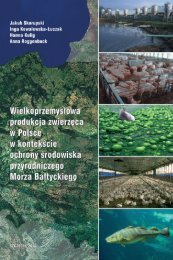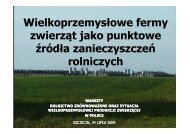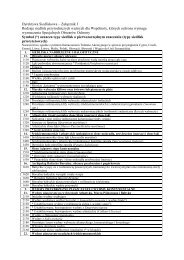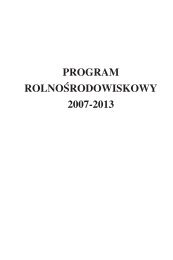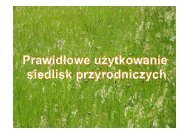best available technologies for manure treatment - Baltic Green Belt
best available technologies for manure treatment - Baltic Green Belt
best available technologies for manure treatment - Baltic Green Belt
Create successful ePaper yourself
Turn your PDF publications into a flip-book with our unique Google optimized e-Paper software.
Best Available Technologies <strong>for</strong> <strong>manure</strong> <strong>treatment</strong> baltic sea 2020<br />
ANNEX I: REPORT FROM ROUNDTABLE DISCUSSION<br />
ANNEX I: REPORT FROM ROUNDTABLE DISCUSSION<br />
Background<br />
Researchers/experts, who represent the countries in<br />
the target area in the European IPPC Bureau at JRC<br />
in Seville, as well as farmer’s organisations and authorities,<br />
are important stakeholders <strong>for</strong> the project.<br />
It is important that the project consult the stakeholders<br />
to ensure trust and ownership to the recommendations<br />
the project will develop, to ensure that<br />
the project link up to and support other initiatives<br />
concerning livestock <strong>manure</strong> <strong>treatment</strong> <strong>technologies</strong><br />
and the implementation of the IPPC Directive, and<br />
in order to prepare <strong>for</strong> later, successful implementation<br />
of the projects recommendations.<br />
A roundtable discussion with the stakeholders was<br />
on this background built into the project activities,<br />
and it took place at The Royal Academy of Sciences<br />
in Stockholm on 29 September 2009. Individual<br />
meetings were organised after the roundtable discussion<br />
with selected stakeholders, who were unable to<br />
participate in the roundtable discussion.<br />
Participants<br />
Name Institution Country Tel. E-mail<br />
Thyge<br />
Nygaard<br />
Ilkka Sipilä<br />
Aivars Kokts<br />
Dr. Valerijus<br />
Gasinas<br />
Vaclovas<br />
Berinskas<br />
Danmarks<br />
Naturfredningförening<br />
MTT Agrifood Research<br />
Finland<br />
Animal Production<br />
Research<br />
Ulbroka (Latvian institute<br />
<strong>for</strong> mechanization)<br />
Lithuanian Water<br />
Management Institute<br />
Lithuanian Environment<br />
Protection Agency, Head<br />
of Division <strong>for</strong> pollution<br />
DK + 45 39 174 088 tny@dn.dk<br />
FI +358-3-<br />
41883676 GSM<br />
+358-40-<br />
5077229<br />
ilkka.sipila@mtt.fi<br />
LV +371-29112050 Ulbroka@parks.lv<br />
LT +37034568100 v.gasiunas@water.omnitel.net<br />
LT +37 05 266 2824 v.berzinskas@aaa.am.lt<br />
Lena Rodhe<br />
Swedish Institute of<br />
Agricultural and<br />
Environmental Engineering<br />
SE +46 18 30 33 51<br />
Mobil 076-103 13<br />
33<br />
lena.rodhe@jti.se<br />
Ulla-Britta<br />
Fallenius<br />
Organizers<br />
Swedish Environmental<br />
Protection Agency<br />
SE +46 8 698 10 00 Ulla-<br />
Britta.Fallenius@naturvardsverket.se<br />
Henning L.<br />
Foged<br />
Lotta<br />
Samuelson<br />
Conrad<br />
Stralka<br />
Fredrik<br />
Wulff<br />
CBMI DK +45 89 99 25 36 hlf@cbmi.dk<br />
<strong>Baltic</strong> Sea 2020 SE +46 8 673 97 61 Lotta.samuelson@balticsea2020.org<br />
<strong>Baltic</strong> Sea 2020 SE +46 8 673 97 62 Conrad.stralka@balticsea2020.org<br />
<strong>Baltic</strong> Sea 2020 SE wulff@mbox.su.se<br />
90




